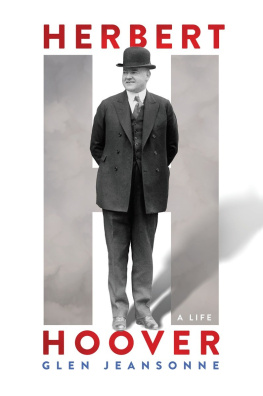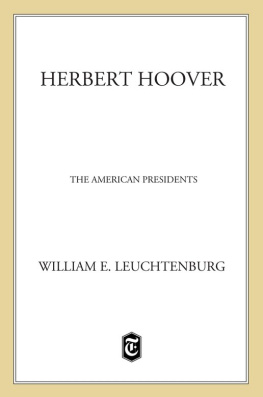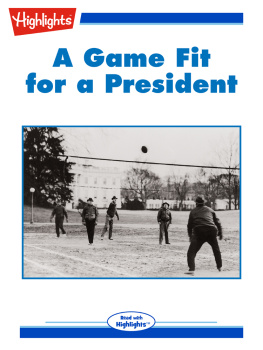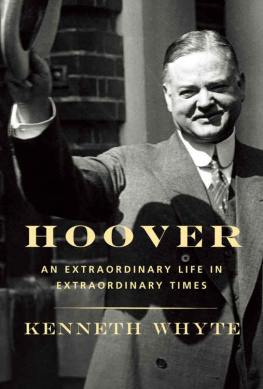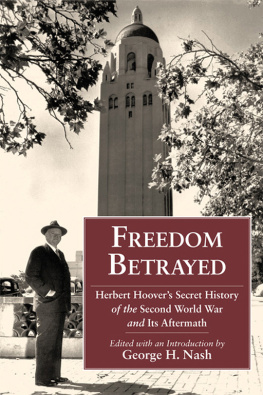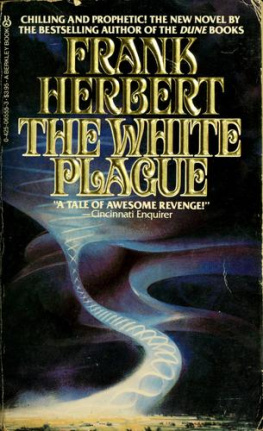Hoover Herbert - Herbert Hoover in the White House: the ordeal of the presidency
Here you can read online Hoover Herbert - Herbert Hoover in the White House: the ordeal of the presidency full text of the book (entire story) in english for free. Download pdf and epub, get meaning, cover and reviews about this ebook. City: USA, year: 2016, publisher: Simon & Schuster, genre: Politics. Description of the work, (preface) as well as reviews are available. Best literature library LitArk.com created for fans of good reading and offers a wide selection of genres:
Romance novel
Science fiction
Adventure
Detective
Science
History
Home and family
Prose
Art
Politics
Computer
Non-fiction
Religion
Business
Children
Humor
Choose a favorite category and find really read worthwhile books. Enjoy immersion in the world of imagination, feel the emotions of the characters or learn something new for yourself, make an fascinating discovery.

- Book:Herbert Hoover in the White House: the ordeal of the presidency
- Author:
- Publisher:Simon & Schuster
- Genre:
- Year:2016
- City:USA
- Rating:3 / 5
- Favourites:Add to favourites
- Your mark:
- 60
- 1
- 2
- 3
- 4
- 5
Herbert Hoover in the White House: the ordeal of the presidency: summary, description and annotation
We offer to read an annotation, description, summary or preface (depends on what the author of the book "Herbert Hoover in the White House: the ordeal of the presidency" wrote himself). If you haven't found the necessary information about the book — write in the comments, we will try to find it.
Herbert Hoover in the White House: the ordeal of the presidency — read online for free the complete book (whole text) full work
Below is the text of the book, divided by pages. System saving the place of the last page read, allows you to conveniently read the book "Herbert Hoover in the White House: the ordeal of the presidency" online for free, without having to search again every time where you left off. Put a bookmark, and you can go to the page where you finished reading at any time.
Font size:
Interval:
Bookmark:
Thank you for downloading this Simon & Schuster eBook.
Join our mailing list and get updates on new releases, deals, bonus content and other great books from Simon & Schuster.
C LICK H ERE T O S IGN U P
or visit us online to sign up at
eBookNews.SimonandSchuster.com


This book is dedicated to my son Dexter and my daughter Kelly, beloved of their father.
History asks: | Did the man have integrity? |
Did the man have unselfishness? | |
Did the man have courage? | |
Did the man have consistency? |
And if the individual under the scrutiny of the historical microscope measured up to an affirmative answer to these questions, then history has set him down as great indeed in the pages of all the years to come.
I was a journalist before I became an author, and all my books tend to reflect the journalistic impulse to discovery. That is, I tend to avoid the beaten path, and choose instead subjects who have been overlooked. That is a rare circumstance for a person who reaches so high an office as the presidency of the United States, but that was the case with Herbert Hoover.
That is not because Hoovers presidency was insignificant. He led the country in the teeth of the most dire economic crisis in American history, a trauma that, in cause and result, might well be considered the labor pains attendant to the birth of the modern era. At the same time, all of the civilized world was wrestling with the allure and the dangers presented by the isms of the left and the rightcommunism, fascism, and every stripe of the spectrum in between. In this titanic struggle, Hoover found the resolve to stay off the shoals and steer by his own lights.
Still Hoover remains very much unknown to most Americans. When he is recalled at all, it is in defeat and in caricaturethe clay-footed conservative who preached the old dogmas of laissez-faire while the false idols of capital came crashing down; handmaiden to the elite, scourge of the huddled masses.
Hoover himself must take some responsibility for this thin and misleading depiction, by dint of his stinting approach to public life. He disliked speeches, made few public appearances, and never formed that bond to the American people that has been the foundation for every successful presidency. More than that, Hoovers successor in office was the twentieth centurys most important president, Franklin Delano Roosevelt. Inevitably, Hoover was overshadowed, his travails ignored, and his moments of success forgotten. In the version of the story written by the winners, Hoover played the foil, the stooge to the princely Squire of Hyde Park.
Certainly Roosevelt joined in this concerted effort to paint Hoover in the most unflattering tones. In the years after he first trounced Hoover, FDR used him repeatedly as the straw man to knock down again. Back in 1932 became a campaign refrain; nor did Roosevelt confine his hostility to elections. When Democratic chieftain Bernard Baruch proposed drafting Hoover to help organize domestic production during World War II, Roosevelt dismissed the notion. Im not Jesus Christ, the president told Baruch. Im not going to raise him from the dead.
And so Hoover remained buried, condemned as a relic of the past by a forward-looking nation. He was a convenient touchstone, a benchmark by which a new generation could measure its politics and its progress, how far they had come and how much they had changed.
But that time, too, has now passed by, or at least arrived at an uncertain maturity. The confidence of the postwar era, the bland acceptance of government intervention and large-scale public spending, has been replaced by ambivalence, with doubts about the efficacy of government and perplexity over mountainous debt. With America and Europe bound together in protracted economic stagnation, the idea of some alternative strategy takes on a new urgency. With so many predictions turned sour, denizens of this modern moment might want to look back.
This book is not an effort to resurrect Hoover as a forgotten hero ready for a new turn in the sun. His was a failed presidency, and not just because of fate, or poor timing. But I do hope in this work to fill in gaps papered over by homilies and assumptions that are now wearing thin. Not all thats been discarded in the headlong rush to the future has been trash; not all that we have acquired along the way has been gold.
The passage of time has wrought another, inevitable effect that makes this book unique, and I hope useful. Until now, every portrait of Hoover has necessarily been colored by the passions and polemics of the era. His biographers were all partisanscommitted either to his defense, or, more common, to showing his error, and thus burnishing the reputation and legend of Franklin Roosevelt.
That is not the case here. This is the first portrait of Hoovers presidency to be drawn at a remove, from published documents and oral histories that can be weighed in the scales of time and experience rather than partisan political belief.
Consider, for instance, the question of who started the Depression, and where it began. For those who lived through those difficult years this was a defining issue, freighted with the burden of blame. In the instant, Hoover insisted that the roots lay abroad, that the economic dislocation of the 1930s began with the Great War and the peace settlement struck at Versailles. To the opposition, it was just as obvious that the Depression was homegrown, the product of Republican policies that were implemented in large part by Hoover himself.
Both sides played this game. It seems apparent that Hoovers insistence on locating the onset of the Depression in Europe was at least in part defensive, and it is equally clear that those who blamed the Republicanswho dominated the boom years but were reviled thereaftersought to score political points.
In the decades since, studies by a generation of economists reached a rough consensus that the Depression was a global phenomenon rooted at Versailles and exacerbated by the efforts of all the Western democracies to resurrect the prewar gold standard. This rendering certainly does not exonerate Hooverhis great error was to fight to the last in defense of gold. But nor does it condemn him the way the New Deal intellectuals would have it. In fact, adherence to the gold standard was one of the few policies to enjoy a real consensus at the time; even those who abandoned gold did so only reluctantly, and only because they saw no way to hold on. Hoover was wrong, but he was not stupid, and he was certainly not the hidebound dullard of popular myth.
Hoover is certainly not obscure. His name pops up frequently, albeit usually as the prototype of a failed president, or leading the pack in a worst-president contest. But the actual Hoover, once hailed as the exemplar of the Progressive era, elected in a landslide, embodiment of the ideal of the nonpolitician elevated to high officethat Hoover has been lost to the modern era.
I knew little of Hoover when I began this project. My previous books dealt with the nations founding era, and with postwar crime and politicsfor me the Great Depression was a blank, memorialized solely in my grandmothers pronouncements about thrift and toil. I began with just one assumptionthat there was more to Hoovers story than the historical caricature marked out above.
Next pageFont size:
Interval:
Bookmark:
Similar books «Herbert Hoover in the White House: the ordeal of the presidency»
Look at similar books to Herbert Hoover in the White House: the ordeal of the presidency. We have selected literature similar in name and meaning in the hope of providing readers with more options to find new, interesting, not yet read works.
Discussion, reviews of the book Herbert Hoover in the White House: the ordeal of the presidency and just readers' own opinions. Leave your comments, write what you think about the work, its meaning or the main characters. Specify what exactly you liked and what you didn't like, and why you think so.

